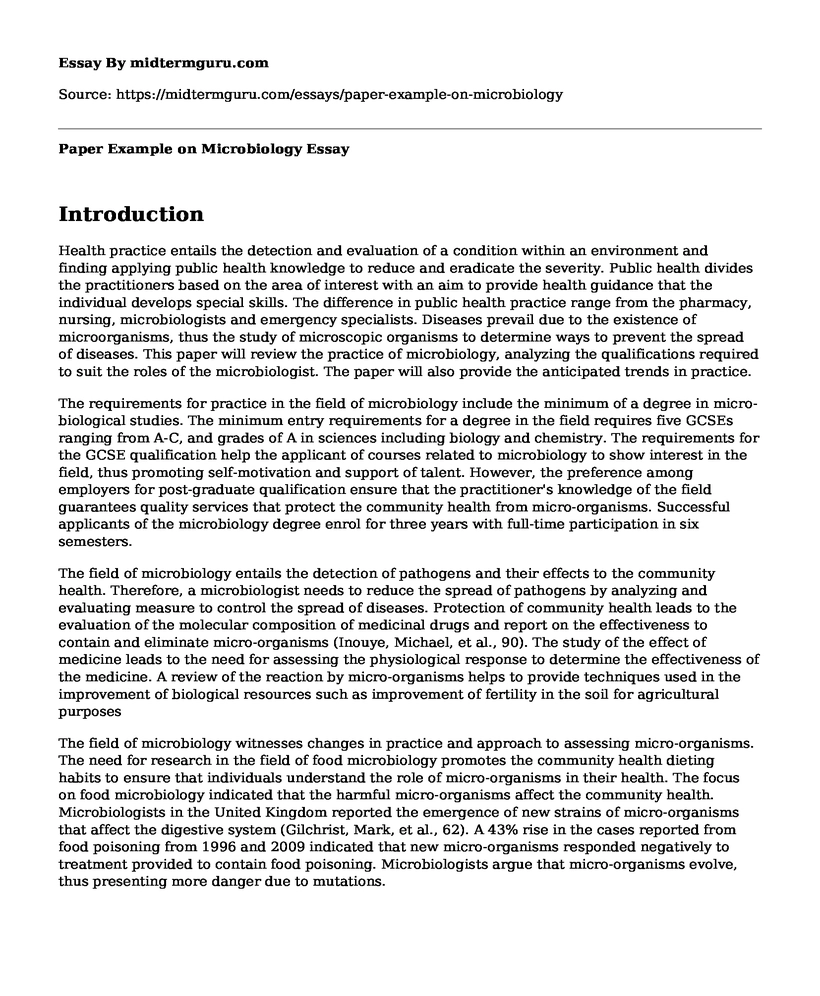Introduction
Health practice entails the detection and evaluation of a condition within an environment and finding applying public health knowledge to reduce and eradicate the severity. Public health divides the practitioners based on the area of interest with an aim to provide health guidance that the individual develops special skills. The difference in public health practice range from the pharmacy, nursing, microbiologists and emergency specialists. Diseases prevail due to the existence of microorganisms, thus the study of microscopic organisms to determine ways to prevent the spread of diseases. This paper will review the practice of microbiology, analyzing the qualifications required to suit the roles of the microbiologist. The paper will also provide the anticipated trends in practice.
The requirements for practice in the field of microbiology include the minimum of a degree in micro-biological studies. The minimum entry requirements for a degree in the field requires five GCSEs ranging from A-C, and grades of A in sciences including biology and chemistry. The requirements for the GCSE qualification help the applicant of courses related to microbiology to show interest in the field, thus promoting self-motivation and support of talent. However, the preference among employers for post-graduate qualification ensure that the practitioner's knowledge of the field guarantees quality services that protect the community health from micro-organisms. Successful applicants of the microbiology degree enrol for three years with full-time participation in six semesters.
The field of microbiology entails the detection of pathogens and their effects to the community health. Therefore, a microbiologist needs to reduce the spread of pathogens by analyzing and evaluating measure to control the spread of diseases. Protection of community health leads to the evaluation of the molecular composition of medicinal drugs and report on the effectiveness to contain and eliminate micro-organisms (Inouye, Michael, et al., 90). The study of the effect of medicine leads to the need for assessing the physiological response to determine the effectiveness of the medicine. A review of the reaction by micro-organisms helps to provide techniques used in the improvement of biological resources such as improvement of fertility in the soil for agricultural purposes
The field of microbiology witnesses changes in practice and approach to assessing micro-organisms. The need for research in the field of food microbiology promotes the community health dieting habits to ensure that individuals understand the role of micro-organisms in their health. The focus on food microbiology indicated that the harmful micro-organisms affect the community health. Microbiologists in the United Kingdom reported the emergence of new strains of micro-organisms that affect the digestive system (Gilchrist, Mark, et al., 62). A 43% rise in the cases reported from food poisoning from 1996 and 2009 indicated that new micro-organisms responded negatively to treatment provided to contain food poisoning. Microbiologists argue that micro-organisms evolve, thus presenting more danger due to mutations.
Conclusion
All in all, the need to increase microbiologists results from the emergence of new diseases and strains of micro-organisms. The government and the private sector should facilitate the research towards ensuring the safety of community health by detecting micro-organisms and combating the harmful. Microbiologists require sustainable salaries to provide motivation and dedication to the field. High remuneration helps to attract more individuals to the practice. An increase in the microbiology workforce is necessary to ensure that the emerging diseases in the growing population receive the attention required by analyzing the bacteria and viruses responsible for the spread of infections.
Works Cited
Gilchrist, Mark, et al. "Antimicrobial stewardship from policy to practice: experiences from UK antimicrobial pharmacists." Infectious diseases and therapy 4.1 (2015): 51-64.
Inouye, Michael, et al. "SRST2: Rapid genomic surveillance for public health and hospital microbiology labs." Genome medicine 6.11 (2014): 90.
Cite this page
Paper Example on Microbiology . (2022, Sep 06). Retrieved from https://midtermguru.com/essays/paper-example-on-microbiology
If you are the original author of this essay and no longer wish to have it published on the midtermguru.com website, please click below to request its removal:
- Paper Example on Microbiology
- Research Paper on Microbiology
- Research Paper on Components of the Brain of Humans
- Biotech: Unlocking Biological Processes for Industrial Use - Essay Sample
- Paper Example on Human Evolution in Relation to Economic Activities
- Reflective Essay on American Museum of Natural History
- A Woman With A 24-Hours Memory - Essay Sample







